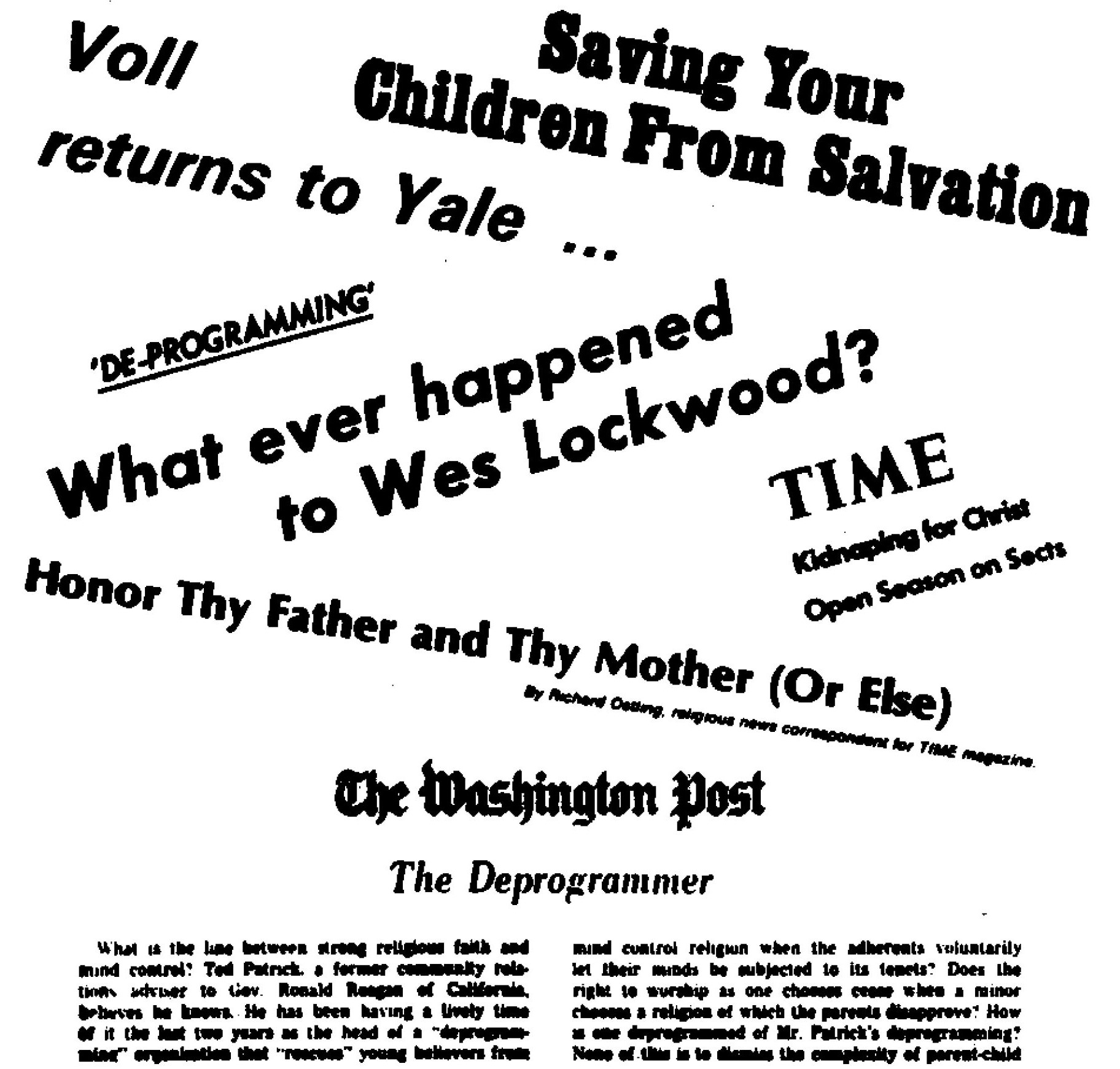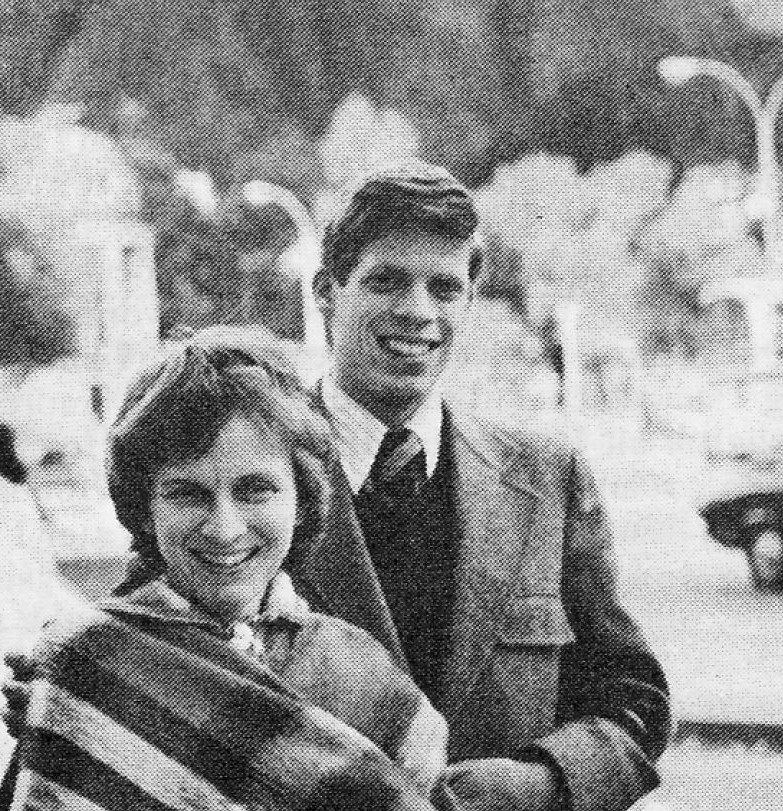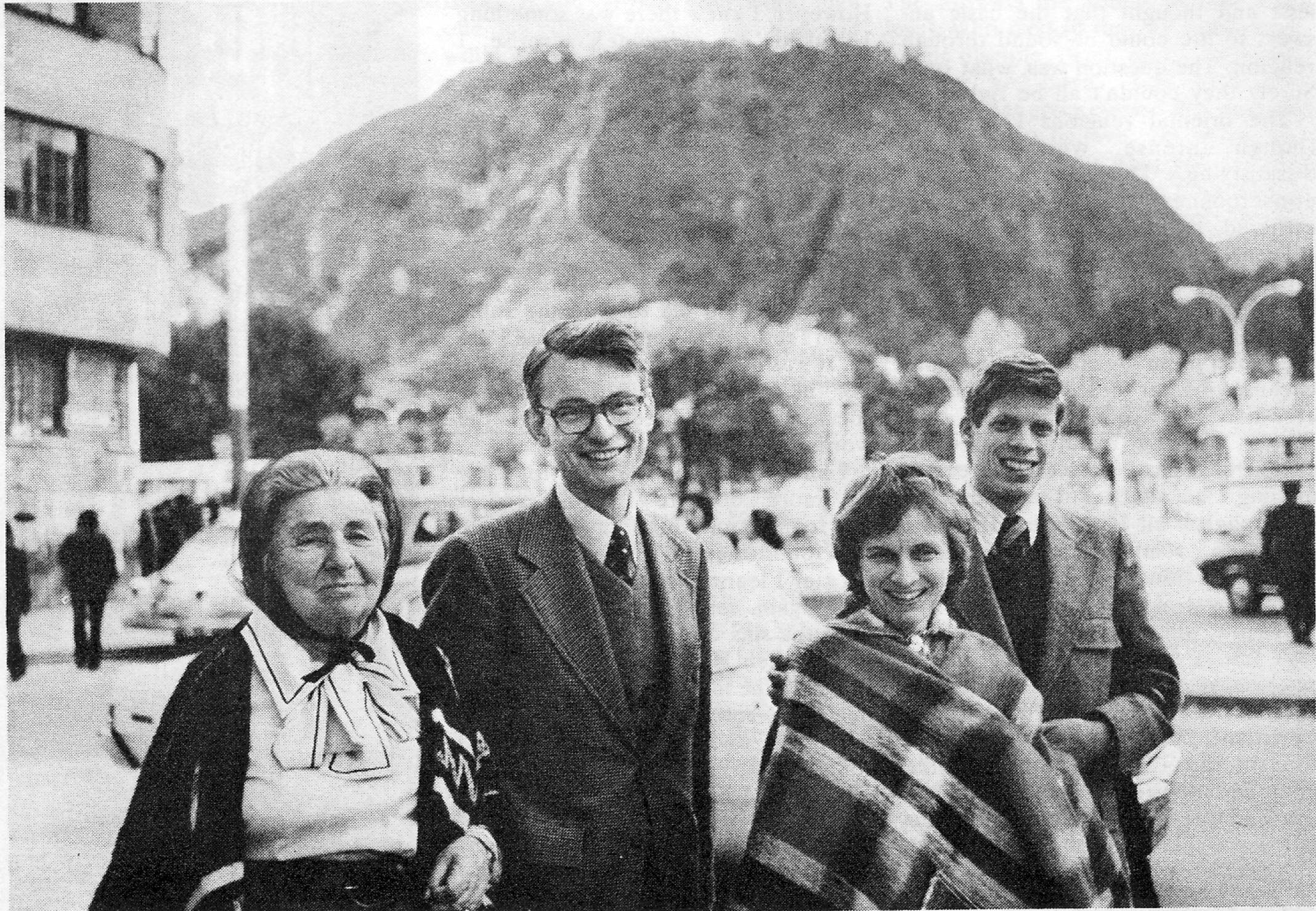“I Took the Road Less Traveled By…”
The Daniel Voll Story
An icy 16-degree night—the frozen sidewalk of 119th Street, New York—two husky men, one black, one white, in trench coats grab 20-year-old and force him kicking into car driven by woman—car rolls downhill with door wide open, youth’s head hanging out, pursued by 25 New Yorkers responding to desperate cries for help—driver goes through red light, is blocked by four police cars….
Beginnings, of course, if you follow them up, lead to places, people, events, difficulties, accomplishments, disappointments, triumphs. It all depends on the beginning you choose and the action you take.
The Daniel Voll Story: “I Took the Road Less Traveled By…”
At the beginning of my freshman year, I chose to follow Christ as Lord and take His road of discipleship. Not a popular road, to be sure, but a fascinating road that has since proved to be even more rewarding than I first expected it to be. “I took the road less traveled by and that has made all the difference.”
After five years of traveling over hills and dales, that road has led me to Bogotá, Colombia, with other Christians on the mission field, where I am presently studying at Los Andes University and teaching English at the Centro Colombo Americano. I couldn’t be more satisfied with the way things have turned out, especially since my parents are now fully in favor of what I am doing. But things were not always so. There was a time when the traveling got rough, and that is what I think will interest you the most: some of the actual curves, cities, and “bridges out” along the road of this pilgrim’s progress.
Not just being religious and going through the rounds, not just having my name on a church membership roll, not just a Sunday suit with matching face, but—A Way of Life. That was what I wanted when I came to Yale in the fall of 1970: a way of life—a Christian way of life—a daily reality. Years before I had received Jesus Christ as my personal Savior, but I knew that I still needed more. I grew tired of religious experimentation: of testing out new liturgies in search of one that would really connect to life and attract the people. I wanted to get down to business and find out what God had in store for my life. When I met the people at the Yale Standard meeting that fall, I knew my search had been answered. These people were not just searching—they were on their way. And so was I.
My parents, suddenly faced with my new enthusiasm and dedication, and with my departure from the staid but solid suburban church in which they reared me, did not understand. What to me was a course of joy, seemed to them a road of danger, and not of promise. Their objections to my beliefs, however, only turned me off and I closed my ears to their persistent complaints.
After my freshman year, I decided to take a year’s leave from Yale, to get some direct experience in my field of interest: publishing. So I packed my bags and moved down to New York City where I began to work in a Christian bookstore. I was also able to work closely with my church, the New Testament Missionary Fellowship, and receive on a regular basis the practical instruction and example of the Christian life I found so helpful.
But the controversy with my parents only intensified through the months, until they were fully ready, unknown to me, to get caught up in the events that were to follow.

January 16, 1973, was a day I’ll never forget. Wes Lockwood, who had been my roommate in freshman year, came out of his job in the Faculty Club and walked a few yards. Without warning, Wes was seized and forced into a car by his father, an uncle, and a black man named Ted Patrick, and driven off. A couple of hours later, at a turnpike tollbooth, he shouted that he was being kidnapped, but it did not end the ride. The purpose: to “deprogram” Wes of his religious beliefs.
The first step was to lock him up. After three days of systematic badgering and heavy accusation at a rooming house in Pennsylvania and two weeks at Patrick’s house in California, Wes was successfully “deprogrammed”—the first Yalie to undergo this very special treatment. And though, in the aftermath, he described us as those who “brainwashed” him, the best description of the “brainwashing” Wes actually received is the one he gave to the Yale Daily News when he told of his “deprogramming” by Ted Patrick:
“I was in such darkness in my own head, it was just ridiculous. Everything was black…total confusion…. And this is what the deprogrammer wants. Part of the effectiveness of a kidnapping is that amount of trauma involved. When somebody is kidnapped and pulled into a situation by force, they feel they’re about to die any minute…. They blockaded the doors with mattresses and beds and we were all locked in there…and then Ted would come in. We’d be eating a meal, and he would pull out a Bible and say, ‘All right now, tell me about this passage here. Now it says here, etc., …. You haven’t been doing this, you’ve been following the devil’s work, right?’ …It eventually worked out like a massive group therapy session, where they would all attack me verbally, and I would just sit there trying to block it out of my head. Trying not to listen…but all the barrage of emotion and words, thrown at you for three days…begins to wear you down…. You become more and more convinced that day by day, that actually you were into the wrong place at the wrong time…. My father wanted to know why I had refused to tell one of the other kids’ father some information about where he worked, and I was afraid…. I wouldn’t tell him. I got really upset because I was afraid they were going to go and kidnap him and I didn’t want anyone going through what I had just gone through, it was the most horrible experience of my life. I still believe it was… it was excruciating…emotionally, very, very painful. I got upset and almost wanted to kill myself.”
That “other kid’s father” was my father. And that “other kid” was me. It turned out that I was next on Patrick’s list of those who were to be abducted and badgered out of their religious beliefs. So Patrick urged my parents, through the Lockwoods, to take the step. It would be so easy, he insisted: a simple matter of hypnotizing me. They finally agreed.

Little did anyone guess that the strange events of those days would be broadcast and framed in headlines in newspapers and magazines across the nation.
That was in the last few days of January in 1973. Little did anyone guess that the strange events of those days would be broadcast and framed in headlines in newspapers and magazines across the nation. “Deprogramming,” which had been going after “Jesus freaks” on the West Coast for over a year, had now come East.
I still have a badly disfigured finger to remind me of that freezing winter night, the police station, St. Luke’s Hospital, the subsequent court trial of Ted Patrick. Wes’s testimony, Patrick’s grin. I thank God it was only my finger that was injured, and not my mind. Patrick never had the opportunity to get me behind locked doors to try to crack my mind—he calls it “breaking” a person. He only got me halfway into a car; then the police intervened.
Patrick was acquitted in the trial, on the argument that he was only acting as the agent for my parents who were only trying to do what they, whether rightly or wrongly, thought best for me. But they left the courtroom without their son. We were, by now, miles apart: in heart, in soul, in mind.
They, I felt, were crushed by the experience, and I wondered if things could ever be the same. The ties between us, it seemed, had been broken. The attempt to take me away and force me out of my beliefs had widened the gap between us by what seemed like miles. And still the controversy continued. My mother publicly insisted that she would find “the way” to bring me out of my supposed condition.
Their view of my life and associations, not favorable to being with, had been totally soured by Patrick’s advice. The man seeks out parents who are uneasy or dissatisfied with something about the way one of their kids is going. Posing as an expert on “cults,” he tells them things are much worse than they had suspected, that their son or daughter has been “mesmerized” and brought under powerful control. This, he says, must be broken by swift and forceful methods.
Then he offers his solution: abduction, followed by involuntary imprisonment at some prearranged location, followed by days and nights of grueling “deprogramming” sessions until the subject “breaks.”
All Patrick asks is a few necessary expenses—for plane fares, hotels, rented cars, meals, anywhere from a few hundred dollars up into the thousands—not too much to pay to force your son or daughter back onto the right track.
The assumption, of course, is that he is on the wrong track. I knew what my parents did not know—that I was not, as Patrick said, in some weird cult. I had come into a good relationship with other Christians, a relationship that was important to me because it met some of my deepest desires. And I knew that the fellowship I was in was made up of intelligent people working, some with recognized distinction, in a variety of fields. Yet to Patrick, we were nothing but a collection of “zombies” and malign manipulators. His answer to his own analysis called for the emergency cancellation of personal and religious liberties—especially mine.
But what Patrick was working overtime trying to annul, I found growing stronger within me and my friends. I had not come into this way of life by chance, and I was not about to throw it over at the insistence of some heavy-handed “zombie” hunter.
Early in my life I had received Jesus Christ as my personal Savior, and I quickly found that He was not one to forsake those who trust in Him. He was, as the Scriptures say, “a friend that sticks closer than a brother” (Proverbs 18:24).
During my high school years I began to see that the call of Christ was much more than a summons to a life of middle-class virtue punctuated by Sunday ritual.
As this early relationship deepened, I sensed God’s call to me to give Him more than just my friendship, more than my spare-time attention. It was a call to discipleship: to give Him my future, my life, my all. And that is what I did. Not knowing what He had in store, what I would encounter, where I might be going, I gave the Lord my answer and put my life into His hands.
That one word, “Yes”—that answer, that decision—was the beginning for me: a beginning that led me to other Christians, to fellowship, to service—but also face-to-face with Patrick.
I came down to Colombia, South America, something I had wanted to do for years, to set up my life away from the shadow of “deprogramming” and pursue my career in Christian service.
It wasn’t very long before my mother followed—fully ready to do whatever might be necessary to persuade or pressure or force me to leave Bogotá, to leave my friends, and to return to the States with her. That was the beginning of the end.
I, unwilling to comply, proposed (as I had done a number of times before) that we talk: talk about anything and everything—her complaints, our disagreements, my life. She accepted my proposal and the Bogotá Peace Talks began.
For two weeks we talked, toured, chatted, dined, shopped, mused—and in the end had a beautiful time. She moved into a room in my apartment and visited the English classes I taught. The son she met was not like the one she had expected. She was delighted with my teaching ability—my father is an educator—and was reassured when she saw that I had not lost my sense of humor, which, according to her, was psychological proof that I was not brainwashed.
She met and had lunch with Mrs. Hannah Lowe, who has spent a good 35 years living and working with the Colombians, and others of the fellowship; her suspicions and fears of five long years gave way to a friendship and an appreciation of something that speaks louder than words: a way of life.
That was what changed her mind: seeing us the way we are and not as we had been depicted to her. She realized that what she had wanted all along was not a young man pressed into some mold by his parents, by Patrick, or by anyone else; but simply her own son, living his own life in his chosen way. In fact, she said that she now believes it was the mercy of God that they and Patrick did not succeed in their attempt to seize and “deprogram” me.
Now we are reunited and reconciled, not by the hand of Patrick, but by the hand of God. A mountain has been moved, a sea has been crossed, and our faith in the wisdom and power of God is stronger because of it.
It was a little over five years ago, in the summer of 1970, that I told the Lord Jesus Christ that my life was unreservedly His. Since that time there have been severe difficulties and times of testing, but through them all there has been the continual peace and deep satisfaction that my life was not being spent in vain, but was counting.
Now I see the value of pressing on down that road, even when things get rough. For though this road is less traveled by, it certainly made the difference in my life, and will make the difference in anyone’s life who, at the time of decision, chooses to pursue it.
Perhaps some of you have thought about God’s call and considered the prospect of living your life for Him. Why not take the first step today and turn your heart, your future, your life over to the Lord Jesus Christ?
Many promises of the Scriptures go with such a decision. One that has encouraged me is:
“The path of the just is as the shining light that shines more and more unto that perfect day” (Proverbs 4:18).
Daniel Voll, Jonathan Edwards ’74

“The path of the just is as the shining light that shines more and more unto that perfect day.”
Proverbs 4:18

